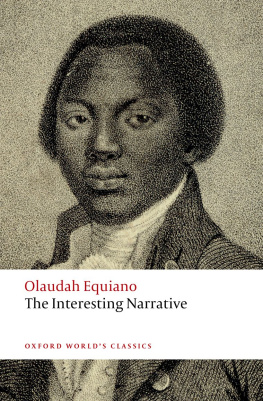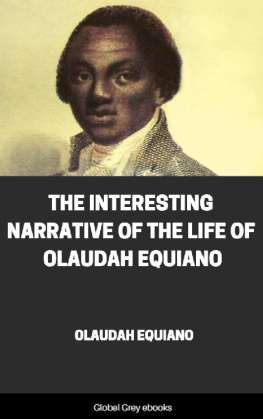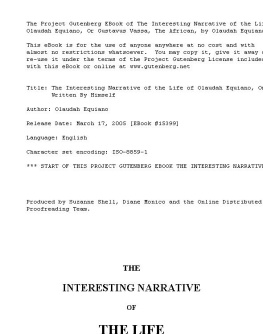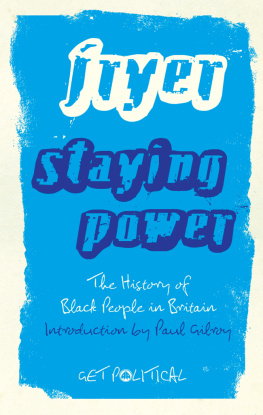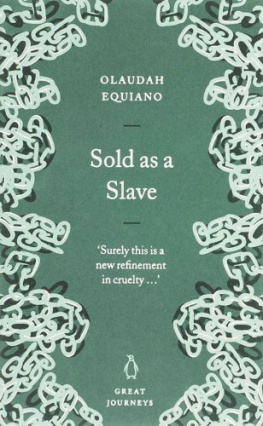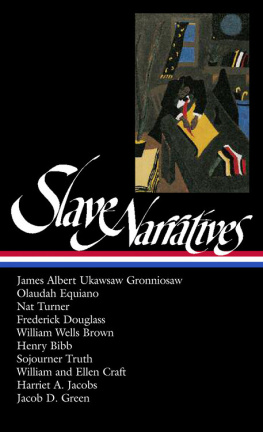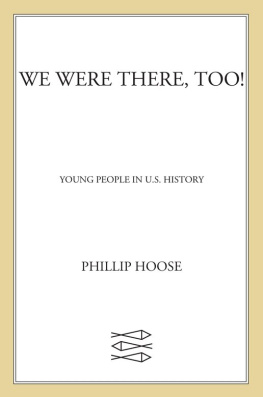Olaudah Equiano - The Interesting Narrative
Here you can read online Olaudah Equiano - The Interesting Narrative full text of the book (entire story) in english for free. Download pdf and epub, get meaning, cover and reviews about this ebook. year: 2017, publisher: OUP Oxford, genre: Religion. Description of the work, (preface) as well as reviews are available. Best literature library LitArk.com created for fans of good reading and offers a wide selection of genres:
Romance novel
Science fiction
Adventure
Detective
Science
History
Home and family
Prose
Art
Politics
Computer
Non-fiction
Religion
Business
Children
Humor
Choose a favorite category and find really read worthwhile books. Enjoy immersion in the world of imagination, feel the emotions of the characters or learn something new for yourself, make an fascinating discovery.
- Book:The Interesting Narrative
- Author:
- Publisher:OUP Oxford
- Genre:
- Year:2017
- Rating:4 / 5
- Favourites:Add to favourites
- Your mark:
- 80
- 1
- 2
- 3
- 4
- 5
The Interesting Narrative: summary, description and annotation
We offer to read an annotation, description, summary or preface (depends on what the author of the book "The Interesting Narrative" wrote himself). If you haven't found the necessary information about the book — write in the comments, we will try to find it.
The Interesting Narrative — read online for free the complete book (whole text) full work
Below is the text of the book, divided by pages. System saving the place of the last page read, allows you to conveniently read the book "The Interesting Narrative" online for free, without having to search again every time where you left off. Put a bookmark, and you can go to the page where you finished reading at any time.
Font size:
Interval:
Bookmark:

Olaudah Equiano was born around 1745, either in West Africa or in South Carolina. By his own account, he was kidnapped from his African village in about 1753 and put on board a European slave-ship. After a horrific transatlantic voyage, he was sold as a slave to a British sea captain called Michael Pascal who gave him the name Gustavus Vassa. As Pascals slave, Equiano saw action with the Royal Navy during the Seven Years War and learned to read and write. In 1763, he was sold to a Quaker planter on the Caribbean island of Montserrat but after three years saved enough money from trading to buy his own freedom. Moving to London, he worked as a personal servant and ships steward, joining an expedition to find a north-east passage across the Arctic, and another to found a colony on the Caribbean coast of Central America. He experienced a profound conversion to Christianity in 1774. In 1787, he briefly worked on a scheme to resettle Londons black poor in Sierra Leone, but was dismissed for protesting at the corruption he witnessed. He joined the campaign for abolition of the British slave trade, contributing his own testimony as The Interesting Narrative, which was published in 1789. He toured Great Britain and Ireland giving readings and worked on a further eight revised editions. In 1792 he married Susanna Cullen, an Englishwoman from Soham in Cambridgeshire, and they had two daughters. He died in London in 1797.
Brycchan Carey is Professor of English at Northumbria University. A specialist in the literature and culture of slavery and abolition, his publications include British Abolitionism and the Rhetoric of Sensibility (2005) and From Peace to Freedom: Quaker Rhetoric and the Birth of American Antislavery (2012).
For over 100 years Oxford Worlds Classics have brought readers closer to the worlds great literature. Now with over 700 titlesfrom the 4,000-year-old myths of Mesopotamia to the twentieth centurys greatest novelsthe series makes available lesser-known as well as celebrated writing.
The pocket-sized hardbacks of the early years contained introductions by Virginia Woolf, T. S. Eliot, Graham Greene, and other literary figures which enriched the experience of reading. Today the series is recognized for its fine scholarship and reliability in texts that span world literature, drama and poetry, religion, philosophy and politics. Each edition includes perceptive commentary and essential background information to meet the changing needs of readers.

Great Clarendon Street, Oxford, ox 2 6 dp , United Kingdom
Oxford University Press is a department of the University of Oxford. It furthers the Universitys objective of excellence in research, scholarship, and education by publishing worldwide. Oxford is a registered trade mark of Oxford University Press in the UK and in certain other countries
Editorial material Brycchan Carey 2018
The moral rights of the authors have been asserted
First published as an Oxford Worlds Classic 2018
Impression: 1
All rights reserved. No part of this publication may be reproduced, stored in a retrieval system, or transmitted, in any form or by any means, without the prior permission in writing of Oxford University Press, or as expressly permitted by law, by licence or under terms agreed with the appropriate reprographics rights organization. Enquiries concerning reproduction outside the scope of the above should be sent to the Rights Department, Oxford University Press, at the address above
You must not circulate this work in any other form and you must impose this same condition on any acquirer
Published in the United States of America by Oxford University Press 198 Madison Avenue, New York, NY 10016, United States of America
British Library Cataloguing in Publication Data
Data available
Library of Congress Control Number: 2017935861
ISBN 9780198707523
ebook ISBN 9780191017131
Printed in Great Britain by Clays Ltd, St Ives plc
Links to third party websites are provided by Oxford in good faith and for information only. Oxford disclaims any responsibility for the materials contained in any third party website referenced in this work.
On a warm morning in the summer of 2003, the then President of the United States of America, George W. Bush, addressed the then President of Senegal, Abdoulaye Wade, at a ceremony on Gore Island, a former slave-trading fort in the Atlantic Ocean, clearly visible from the quayside of the Senegalese capital Dakar. In this, his first visit to Africa, President Bush spoke, as he put it, mindful of past wrongs and dedicated to the advance of human liberty. He reflected on the brutal history of slavery in both Africa and America before noting the paradox of American liberty: that the freedom and prosperity enjoyed by many Americans in its early years came at a steep price, when one in every seven human beings was the property of another. In this era, Bush noted, a man named Olaudah Equiano was taken in bondage to the New World. He witnessed all of slaverys cruelties, the ruthless and the petty. He also saw beyond the slave-holding piety of the time to a higher standard of humanity. This man, said President Bush, was followed by many others who took a stand against slavery, racism, and oppression; the very people traded into slavery, he said, helped to set America free.
Olaudah Equiano may have been surprised to have been associated so strongly with the United States, a country which he had visited but in which he had never been resident. Nevertheless, he would, one suspects, have been delighted to have had his life and work celebrated by the leader of the most powerful nation on earth in the name of international friendship, African development, and the progress of freedomideals which were central to his life and work. That Equianos fame would endure into the twenty-first century was no sure thing. Successful in his own time, and remembered for a few decades after his death in 1797, he was largely forgotten until the mid-twentieth century when scholars in Scotland, England, Nigeria, and the United States rediscovered his work and hailed him as a distinctive and important voice of the age of slavery. By the start of the twenty-first century, his only major writing, The Interesting Narrative of the Life of Olaudah Equiano, or Gustavus Vassa, The African Written by Himself (1789), was available in print, in anthologies, and online, and was read by scholars, students, and interested readers across the world. When an American president made Equiano the centrepiece of a speech in Africa, it was a signal that Equianos life and work were no longer considered as interesting but obscure historical asides, but rather as central moments in a global struggle against slavery and oppression.
The work on which Equianos reputation rests, The Interesting Narrative, can be viewed in many lights, but at its most simple level it is the autobiography of an individual who tells his story from his earliest recollections to the point immediately before the book was published. The author was born, he tells us, as Olaudah Equiano, the son of a chief in the Igbo-speaking region of Guinea, which today corresponds to south-east Nigeria. He had a happy childhood until, at about the age of eight or ten, he and his sister were kidnapped by strangers and forcibly marched to the coast. The journey took several months, after which he was separated from his sister and put aboard a European slave-trading ship. After experiencing a horrific transatlantic voyage, he was taken first to Barbados and next to Virginia, where he was sold as a slave to a British sea captain called Michael Pascal who gave the child the name Gustavus Vassa, which he would continue to use throughout the rest of his life. With Pascal, Equiano served on a variety of Royal Navy warships during the Seven Years War (175463) where he saw action in Canada and the Mediterranean and learned to read and write. In late 1762 he was unexpectedly sold and taken to the Caribbean island of Montserrat, where he became the slave of a Quaker planter, Robert King. After three years, the young man had saved up enough money from trading to buy his own freedom, and shortly after he departed for London where he trained as a hairdresser. For the next twenty years he worked variously as a personal servant and as a ships steward, taking voyages to the Mediterranean and America. In 1773 he joined Constantine John Phippss famous expedition to find a north-east passage across the Arctic to the Pacific, experienced a profound conversion to Christianity in 1774, and in 1776 took part in a short-lived scheme to found a colony on the Caribbean coast of modern-day Nicaragua. In 17867, he briefly worked for the British government as a Commissary of Provisions and Stores for the scheme to resettle Londons black poor in Sierra Leone, before being dismissed after protesting at the corruption he witnessed. He then turned his attention to supporting the campaign for the abolition of the British slave trade, writing to newspapers, petitioning the Queen, and finally contributing his own testimony to the cause in the form of
Font size:
Interval:
Bookmark:
Similar books «The Interesting Narrative»
Look at similar books to The Interesting Narrative. We have selected literature similar in name and meaning in the hope of providing readers with more options to find new, interesting, not yet read works.
Discussion, reviews of the book The Interesting Narrative and just readers' own opinions. Leave your comments, write what you think about the work, its meaning or the main characters. Specify what exactly you liked and what you didn't like, and why you think so.

